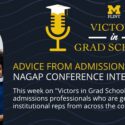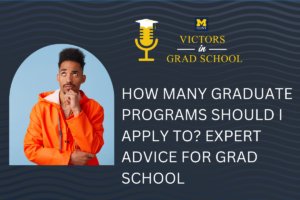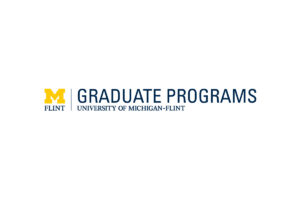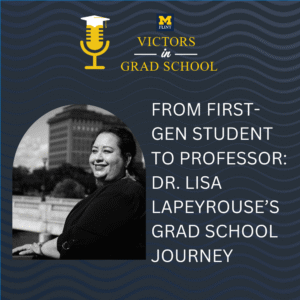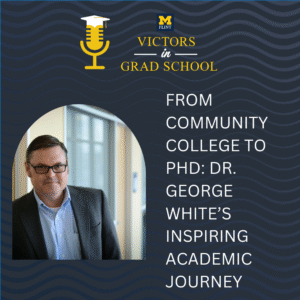Welcome back to the Victors in Grad School podcast! In today’s episode, titled “Advice from Admission Professionals on Succeeding in Graduate School,” we bring you a unique and insightful perspective on graduate school success. Our host, Christopher Lewis, attended the NAGAP conference in New York City and had the opportunity to speak with admission professionals from various institutions across the United States. These experts shared their valuable advice and recommendations for students navigating the graduate school journey. Join us as we dive into their thoughts on finding balance, choosing the right program, utilizing resources, and building a support system. Whether you’re a current graduate student or considering pursuing higher education, this episode is packed with practical tips to guide you on your path to success. Stay tuned and get ready to absorb the wisdom of these seasoned professionals. Let’s jump in!
Guests
- Christopher Lewis, University of Michigan-Flint
- Stanley Kania, Drexel University College of Medicine
- Lucy Holecek, Russell Sage College
- Taylor White, Ohio State University
- Amanda Selby, AT Still University
- Jennifer Nyeste, New Jersey City University
- Adeel Ahmed, University of Colorado – Boulder
- Sherry Quinn, Wayne State University
- Seth Gummere, Study Portals
- Taylor, Western Michigan University
- Aisling Sive, University of Rochester
- Jared Pic, Georgetown University
- Channing Ford, Jacksonville State University
- Ashlee Hanley, Jacksonville State University
- Jamie Kainz, International Institute for Restorative Practices
- Jeremy Mixell, University of Chicago
- Alaina Coe, Bowling Green State University
- Aaron Coffey, Wichita State University
- Aaron Berger, Kent State University
- Raymond Herrera, Washington State University
- Ken Lundy, Stetson University
Transcript
Christopher Lewis [00:00:01]:
Welcome to the Victors in Grad school podcast where we have conversations with students, alumni, and experts about what it takes to find success in graduate school.
Christopher Lewis [00:00:11]:
Welcome back to Victor’s in grad school. I’m your host Dr. Christopher Lewis, Director of Graduate Programs at the University of Michigan-Flint. Really excited to have you back again this week. This week’s a different type of episode. I attended the NAGAP conference in New York City this spring. NAGAP is the National Association of Graduate Admission Professionals. And at that conference, I talked to quite a few different admission professionals about Some of the things that they recommended, some of the things that they encouraged students to think about when thinking about success in general. And these individuals come from many different institutions from all over the United States, and I wanted to be able to bring you their voice to share some of their thoughts and perspectives from working with many different graduate students over the years because I know that their voices and their thoughts and ideas can help you again to find success in the journey that you’re on. I’m really excited to be able to introduce all of them to you and have you listen and learn from them and be able to take things that you can implement right away. Enjoy.
Stanley Kania [00:01:33]:
So the name is Stanley Kania, Drexel University College of Medicine, Assistant Dean of Admissions, and my advice to graduate students on How to be successful is definitely finding what I call the perfect balance. And that’s the balance between your personal obligations professional obligations, your academic obligations, graduate school, no matter what level, if it’s a bachelor’s or a doctorate, it’s certainly a marathon. It’s not a So what students need to do is they need to ensure that they have time to fill their bucket with all the responsibilities and attention that they need to give educational experience and help them want to be that advocate for their friends, their family, their spouse, their children, what have you, to pursue a graduate education and to understand the value in that type of investment.
Lucy Holecek [00:02:35]:
My name is Lucy. I’m the associate director in the graduate enrollment management office at Russell Sage College in both Albany and Troy, New York. And I would say the top piece of advice I give to any student I work with is to make sure that they find the best fit for themselves both financially and time wise as at my institution have many online and in person programs. So I work with a lot of adult learners who have children and full time jobs. So definitely finding some thing that fits their schedule, I’d say is the best advice that I would give.
Taylor White [00:03:16]:
This is Taylor White Graduate Program Manager at the School of Environment And Natural Resources at the Ohio State University. I’d have to say that The most important thing for ensuring success in graduate school is finding a good fit with a faculty member. It may not be important for every type of program there, but especially for your STEM based programs. It’s one of the most important things, if not the most important thing. Depending on the admissions process of your program, you may need to talk to a fact team member before you apply, or it may be a connection that’s made after you’re admitted. So make sure that you check-in with the application website, graduate program staff, and make sure that you understand what expected of you during that process because that fit with the faculty advisor is going to carry you through all the way up through graduation and beyond when you’re out on the job market.
Amanda Selby [00:04:06]:
Hello. My name is Amanda Selby. I’m the assistant director of admissions at AT Stills University. My piece of advice for a student to be successful would be to be willing to use the resources that are provided to you and remember the reasons why you’re pursuing graduate degrees because it’s gonna get really hard and you’ve gotta keep that passion alive. So remember why you’re doing this, use the resources Be flexible. That’s my advice.
Jennifer Nyeste [00:04:38]:
My name is Jennifer Nyeste. I’m a director of admissions at New Jersey City University, and one piece of advice I would give to a student looking at graduate schools is to keep it open mind, there is a fit in a place for everyone. It might not be at my institution, but you have a lot champions out there trying to help you find your path. Just keep an open mind and ask all the right questions, and you’ll find the resources available to you. Hello.
Adeel Ahmed [00:05:08]:
My name the Adeel Ahmed. I serve as the senior graduate recruiter at the University of Colorado Boulder. One piece of advice I would give to anyone looking into grad school is try to figure out your long term career goals. Before you decide on what program, what school you want to apply for, this will make it a lot easier in the long run if you kind of a sense of what you wanna do with your masters or doctoral degree. This will save you a lot of stress and just time in figuring out kind of where to go after that degree because you really should think about your degree as a stepping stone to something greater beyond grad school, not just as it ended in of itself, but it means to an end. So that’s kinda one piece of advice I would give as you’re looking to applying to a master’s or doctoral or other graduate program.
Sherry Quinn [00:06:14]:
Hi. This is Sherry Quinn. I’m with Wayne State University Graduate School, director of graduate admissions and enrollment management. And so today, I like to give some advice to prospective students on the success in their journey. I would say what you need to do is to stay the course. Be persistent. Stay the course.
Seth Gummere [00:06:32]:
I am Seth Gumry, Senior Vice President, the North America for study portals. My one piece of advice would be to find where you fit, not just academic and program wise, but where do you see yourself as a good fit with the other students who are at the institution? The faculty members just the overall culture. Academic programs are incredibly important, but sometimes we can get too caught up in the details of what we were gonna be learning and who we’re gonna be learning from and forget about our own personal connection to the school and to the other students who are in the classroom with you.
Taylor from WMU [00:06:38]:
My name is Taylor, and I’m from Western Michigan University. My advice for incoming students considering graduate school would be to get to know not only the school that you’re applying to, but the community that you’re gonna be living in. Do they have the resources that you need in your community? Do they have your interest groups. Are you gonna be able to make friends and make valuable connections in that area outside of your program and go out and find things to do that make you feel valued supported and having a good time in the community that you live in.
Aisling Sive [00:07:13]:
My name is Ashley Sive. I work at the University of Rochester. I am the director of graduate admissions for our art sciences and engineering programs. I think one of the biggest pieces of advice that I like to give both prospective students, but also our current students is once you arrive on campus to find your partners and find your support system, I think graduate education can be isolating some times it’s different than undergrad that you’re not as integrated on campus. So you kinda have to do a little more leg work in seeking out those support systems and seeking out those people, but it’s really important that you do because you’re gonna find that you want them at some point along the road because it is a hard road, particularly if you’re pursuing a PhD, and you wanna make sure that you have those people that you can go to and and seek support from.
Jared Pic [00:08:47]:
My name is Jared Pic. I am the assistant director of admissions and alumni engagement at Georgetown University School of Foreign Service Center for Security Studies. I’m a biggest piece of advice would definitely be writing skills. I mean, what I mean by that is especially if you’ve been out of school for a while, maybe it takes some time to learn how to develop your writing skills through the writing talk with professors, citations, and such, how to research properly, how to quote things properly, paraphrasing, etcetera, really take the time out side of just the lectures to really meet with faculty and writing services to really develop those skills because you could use them outside of work and also into future academic things such as BHGs and such. So definitely make sure you’re taking the time to hone your writing skills overall.
Channing Ford [00:09:38]:
I’m Channing Ford. I’m Dean of Graduate Studies at Jacksonville State University in Jacksonville, Alabama. And my advice for a prospective student would be to identify a great mentor that understands you as a student that understands what you want out of your academic journey and who’s gonna be your touchstone during that process. Mentor can be anyone within your program can even be a professional that you’re working with in the field. It’s just important to make sure that you look to them to kind of help serve as your inspiration for what you want to do once you complete your program.
Ashlee Hanley [00:10:18]:
I’m Ashlee Hanley, the Assistant Director of Graduate Studies at Jack Cymbal State University, and Jack Cymbal Alabama. And my advice would be to find a way to balance your life early on. Sometimes the course load and your assignments can get a little overwhelming at times, and you have to find a way to balance your work life, your home wife, and your school, all at the same time. And when you find that balance, you’re able to be successful in whatever you do, and you’re able to push yourself further in your education.
Jamie Kainz [00:10:53]:
My name is Jamie Kaines. I’m the dean of student services at the IIRP Graduate School And my one piece of advice to a prospective graduate student is to believe that you can do it. Believing yourself, you’re stronger than you realize.
Jeremy Mixell [00:11:13]:
My name is Jeremy Mixell. I’m from Loyola University, Chicago. I think that I would recommend for graduate students just to put yourself out there. I think the faculty may seem distant at first, right, to get a hold of, but I think definitely reaching out to them, working with them as mentors, and really getting to know them, getting to know their interests brought them to the field will help inspire your own passions and really help you, make the connections that you’re looking for in order to be successful.
Alaina Coe [00:11:46]:
My name is Alaina Coe. I work with Bowling Green State University as the graduate admissions counselor in the graduate admissions office, and I believe for a student to be successful on their graduate school journey is to make connections, build bridges. It is better to know many people with different backgrounds and ways that they have done things and hear about their stories and to know how to apply that your own life and to really make those connections in those bridges so that you can then for later on possibly use those for your own experience. So that’s what I would say is the most successful.
Aaron Coffey [00:13:08]:
This is Aaron Coffey, the assistant Dean of the school at Wichita State University, when thinking about graduate school and how to be successful, graduate students really need to remember why why they’re making the decision to pursue what they’re pursuing and what their goal is, they’re going to experience so many challenge is during their education. They’re going to question themselves. They’re going to face imposter syndrome. They’re gonna question the outcomes the application of what they’re doing to a future career. But at the end of the day, they started this journey for a reason, and they need to remember why they’re doing what they’re doing and how it’s going to impact them going forward through the the good things and the bad things that they experience if they are going time, part time, and have to take a break continuing with no breaks or coming back after after starting 2 years ago and finishing, the goal will be the same. The impact them would be the same. And they’re gonna have other people telling they can do it. They just need to remember that they can do it, remind themselves that they can do it and that they’re doing it for a reason and that’s to achieve something they set out to do with the start.
Aaron Berger [00:14:21]:
Hello. I’m Aaron Berger with, Kent State University. I’m an associate director of graduate recruitment. My piece of advice for somebody looking at getting into graduate school, best piece of advice to be successful in that environment is to realize that you’re not on an island that other people around you, I think sometimes it can feel kind of isolating that you have other people who are in the classes with you and inform a community, even if a formal one doesn’t exist, seek that out, and you’re gonna find strength in numbers.
Raymond Herrera [00:14:58]:
Hi. My name is Doctor Raymond Herrera. I’m an associate vice provost for the graduate school at Washington State University. My one piece of advice for our prospective graduate students is to get involved with research as an undergraduate. It’s super important to get your hands in the lab or in the library, what have you, and get involved with research outside your regular coursework. Factory are often looking for folks who have at least some experience, maybe a little bit of knowledge about how to conduct research. So get involved in research as an undergrad if you can.
Ken Lundy [00:15:28]:
My name is Ken Lundy, assistant director of graduate admissions for the College of Arts and sciences at Stetson University, and a interesting question was posed to me in what advice would I give to a graduate student, basically, that would help them on their journey. And I would say to make sure that you find your community and when I say community, find your safe space so that when there are those time stress those times of need that you have folks or individuals or a per or a group of people that you can go to confide in. They can coach you up. You can coach them. And at the end of the day, they may you a better person because what is said is that iron sharpens iron. So I would suggest that you find your community and work within those finds to be the best graduate student that you can be.
Christopher Lewis:
The University of Michigan Flint has a full array of masters and doctorate programs if you are interested in continuing your education, whether you’re looking for in person or online learning options, the university of Michigan Flynn has programs that will meet your needs. For more information on any of our graduate programs, visit umflint.eduforward/ graduate programs to find out more. Thanks again for spending time with me as you prepare to be a victor in Grand school. I look forward to speaking with you again soon as we embark together on your graduate school journey. If you have any questions or want to reach out, Email me at flintgrandoffice@umflint.edu.

